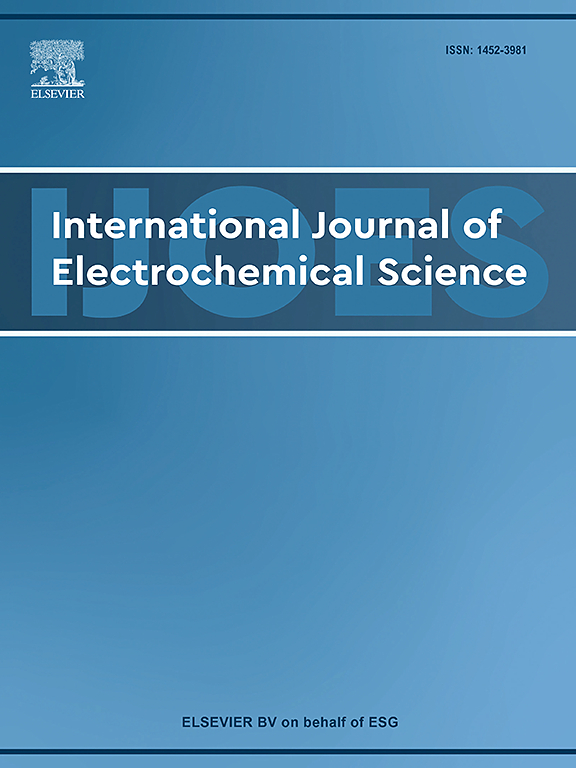Medium-chain fatty acid production via microbial electrosynthesis: Mechanisms, progress, and prospects
IF 2.4
4区 化学
Q4 ELECTROCHEMISTRY
International Journal of Electrochemical Science
Pub Date : 2025-05-31
DOI:10.1016/j.ijoes.2025.101091
引用次数: 0
Abstract
Microbial electrosynthesis (MES) offers a sustainable bioelectrochemical platform for converting renewable electricity and carbon sources, particularly carbon dioxide, into value-added chemicals. Medium-chain fatty acids (MCFAs, C6–C12) are of growing industrial interest due to their versatile applications and potential for sustainable production independent of fossil resources. This review critically examines the biochemical pathways and electrochemical principles underlying MCFA synthesis in MES systems. It also evaluates key system components, including microbial catalysts (e.g., Clostridium, Eubacterium), advanced electrode materials, and innovative reactor designs such as flow-through and fluidized bed configurations. Performance benchmarks, including production rates, titers, selectivity, and energy efficiencies, are summarized to assess technological progress. Major challenges related to electron transfer limitations, competing biological pathways, mass transfer constraints, and economic scalability are discussed. Finally, this review outlines future research directions and highlights how interdisciplinary advancements in reactor engineering, metabolic optimization, and system integration can accelerate the transition of MES from laboratory studies to industrial-scale sustainable bioproduction.
微生物电合成生产中链脂肪酸:机理、进展与展望
微生物电合成(MES)为将可再生电力和碳源(特别是二氧化碳)转化为增值化学品提供了一个可持续的生物电化学平台。中链脂肪酸(MCFAs, C6-C12)由于其广泛的应用和不依赖化石资源的可持续生产潜力而日益受到工业领域的关注。本文综述了MES系统中MCFA合成的生化途径和电化学原理。它还评估了关键的系统组件,包括微生物催化剂(例如,梭状芽孢杆菌,真细菌),先进的电极材料和创新的反应器设计,如流动和流化床配置。性能基准,包括生产速率,滴度,选择性和能源效率,总结评估技术进步。讨论了电子转移限制、竞争生物途径、传质限制和经济可扩展性等主要挑战。最后,本文概述了未来的研究方向,并强调了反应器工程、代谢优化和系统集成的跨学科进展如何加速MES从实验室研究向工业规模可持续生物生产的过渡。
本文章由计算机程序翻译,如有差异,请以英文原文为准。
求助全文
约1分钟内获得全文
求助全文
来源期刊
CiteScore
3.00
自引率
20.00%
发文量
714
审稿时长
2.6 months
期刊介绍:
International Journal of Electrochemical Science is a peer-reviewed, open access journal that publishes original research articles, short communications as well as review articles in all areas of electrochemistry: Scope - Theoretical and Computational Electrochemistry - Processes on Electrodes - Electroanalytical Chemistry and Sensor Science - Corrosion - Electrochemical Energy Conversion and Storage - Electrochemical Engineering - Coatings - Electrochemical Synthesis - Bioelectrochemistry - Molecular Electrochemistry

 求助内容:
求助内容: 应助结果提醒方式:
应助结果提醒方式:


